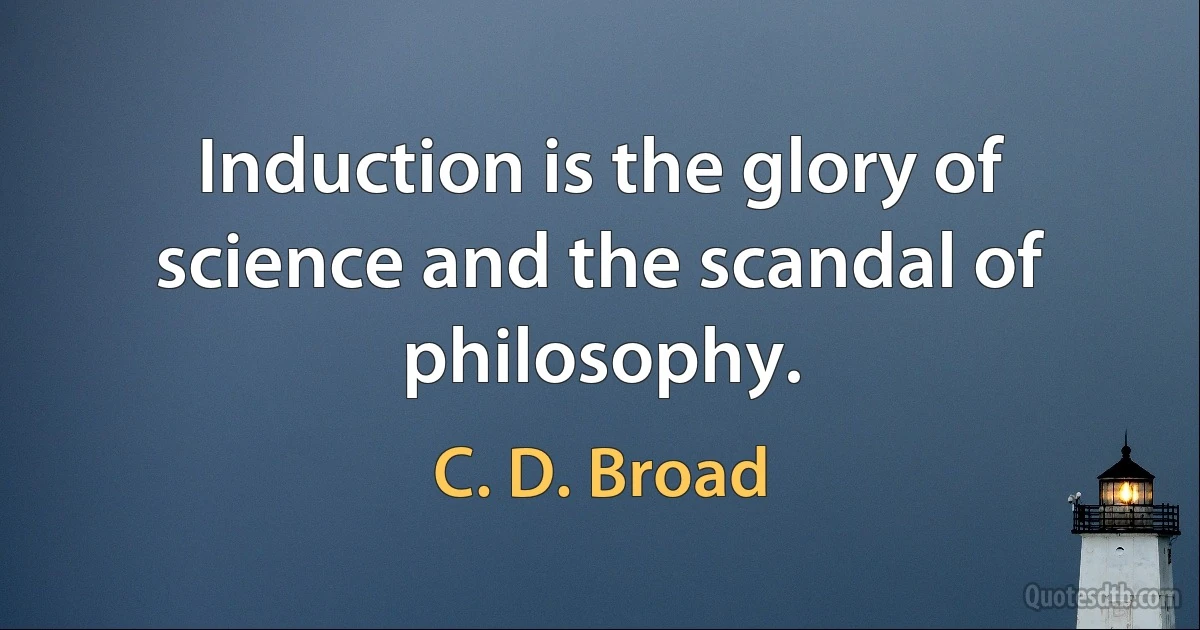C. D. Broad quotes
I understand that it is the wish of the Editor of this collection of essays that each contributor should describe his own system of philosophy. Were I to interpret this demand literally I could not contribute anything at all, for two excellent reasons. In the first place, I have nothing worth calling a system of philosophy of my own, and there is no other philosopher of whom I should be willing to reckon myself a faithful follower. If this be a defect I see no likelihood of its ever being cured. Secondly, if I had a system of my own, I should doubt the propriety of "pushing" my crude philosophical wares in competition with the excellent products of older firms with well-earned reputations.

C. D. Broad
Take an eighteenth century English whig. Let him be a mystic. Endow him with the logical subtlety of the great schoolmen and their belief in the powers of human reason, with the business capacity of a successful lawyer, and with the lucidity of the best type of French mathematician. Inspire him (Heaven knows how) in his early youth with a passion for Hegel. Then subject him to the teaching of Sidgwick and the continual influence of Moore and Russell. Set him to expound Hegel. What will be the result? Hegel himself could not have answered this question a priori, but the course of world history has solved it ambulando by producing McTaggart.

C. D. Broad
Although people cannot define existence and do use the term with some looseness, yet it is possible to give an extensive definition by pointing to the sorts of things that everyone believes to exist. It is still easier to point to the sort of entities that people agree in believing not to exist, and happily, this is really what concerns us most. People mean by saying that causation only applies to things that exist that it applies, if at all, to what can change; and they believe that, if anything can change, it is things like chairs and tables and minds, and not those like the propositions of Euclid and the multiplication table. What would be agreed then is that, if causal laws apply to anything it is to what can change in so far as it changes.

C. D. Broad
There is no important problem in any branch of philosophy which is not treated by Kant, and he never treated a problem without saying something illuminating and original about it. He was certainly wrong on many points of detail, and he may well be wrong in his fundamental principles; but, when all criticisms have been made, it seems to me that Kant's failures are more important than most men's successes.

C. D. Broad
It is to be feared that Spinoza would not have been enlightened enough to appreciate the beneficient system of the Ph. D. degree, introduced into English universities as a measure of post-war propaganda, whereby the time and energy of those who are qualified to do research are expended in supervising the work of those who never will be.

C. D. Broad
It is true that our everyday view of the world is not quite naively realistic, but that is what it would like to be. Common-sense is naively realistic wherever it does not think that there is some positive reason why it should cease to be so. And this is so in the vast majority of its perceptions. When we see a tree we think that it is really green and really waving about in precisely the same way as it appears to be. We do not think of our object of perception being 'like' the real tree, we think that what we perceive is the tree, and that it is just the same at a given moment whether it be perceived or not, except that what we perceive may be only a part of the real tree.

C. D. Broad
C. D. Broad
Occupation: English PhilosopherBorn: December 30, 1887
Died: March 11, 1971
Quotes count: 9
Wikipedia: C. D. Broad








